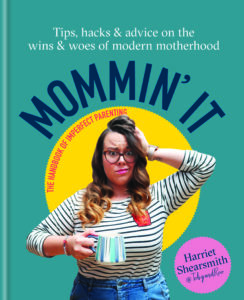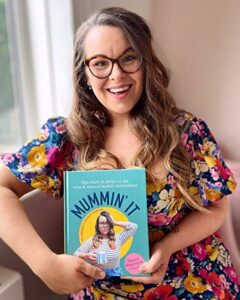Mommin’ It by Harriet Shearsmith (Book Excerpt)

Reprinted with permission from Mommin’ It by Harriet Shearsmith, Kyle Books 2021
Let’s talk chores
When I first became a mum, I never really thought of chores as something that was a controversial or debatable topic. Your kids live in the house, they will one day have to live alone – be that at uni or when they move out – and it’s sensible to teach them how to run a house, right?
Well, apparently it isn’t that simple. There are endless opinions about chores (surprise surprise, isn’t that the case with everything in parenthood?), from which chores are bad for kids to which are good for kids, and when they should start doing them. I think, as with all things parenting, there is one thing to remember: do what works for you.
Do what works for you
In every family set up there will be a different way of doing things, and what Karen down the road thinks you should do is irrelevant, as is what your parents tell you that you had to do as a child. The task is to work out what works FOR YOU and run with it. It will take a bit of fiddling about, but once you find something that you’re happy with, stick with it and add to it gradually. I think it’s really important to note that ‘chore’ doesn’t necessarily mean what it used to. When I was a child, a chore was something like hoovering or collecting all the laundry and loading the washing machine. It was about a child owning a bit of responsibility and helping with simple tasks. Nowadays I think we have a much broader idea of chores than a child simply doing small things like keeping their spaces tidy and picking up toys.
In our house, from an early age, our children have helped out with simple things like clearing the table after a meal and tidying toys and then, as they have gotten a little older, we’ve encouraged them to help us with more and more. We’ve also encouraged their natural preferences. Edith, for example, loves to load the dishwasher and switch it on and she also enjoys sorting the laundry into the right colours and putting on a load. Reuben, on the other hand, prefers preparing food and will happily go into the kitchen and make himself basic meals or snacks if he is hungry. I’m under absolutely no illusion that this will last beyond the age of 13 and beyond then they will all probably resent being asked to do anything that isn’t entirely self-serving, BUT at the moment, it’s a great foundation to have.
In every family set up there will be a different way of doing things, and what Karen down the road thinks you should do is irrelevant, as is what your parents tell you that you had to do as a child. The task is to work out what works FOR YOU and run with it. It will take a bit of fiddling about, but once you find something that you’re happy with, stick with it and add to it gradually. I think it’s really important to note that ‘chore’ doesn’t necessarily mean what it used to. When I was a child, a chore was something like hoovering or collecting all the laundry and loading the washing machine. It was about a child owning a bit of responsibility and helping with simple tasks. Nowadays I think we have a much broader idea of chores than a child simply doing small things like keeping their spaces tidy and picking up toys.
In our house, from an early age, our children have helped out with simple things like clearing the table after a meal and tidying toys and then, as they have gotten a little older, we’ve encouraged them to help us with more and more. We’ve also encouraged their natural preferences. Edith, for example, loves to load the dishwasher and switch it on and she also enjoys sorting the laundry into the right colours and putting on a load. Reuben, on the other hand, prefers preparing food and will happily go into the kitchen and make himself basic meals or snacks if he is hungry. I’m under absolutely no illusion that this will last beyond the age of 13 and beyond then they will all probably resent being asked to do anything that isn’t entirely self-serving, BUT at the moment, it’s a great foundation to have.
Incentives + chores
Do you expect children to do chores for a reward, or just because they are a part of the family and it’s important that everyone has a role to play? Well, I think that’s another one for the ol ‘do what works for you’ line. There are so many ways to reward children for doing simple tasks and, if you want a financial incentive, try using services like Go Henry, where they have their own bank card and you give them a certain amount of pocket money every week. The amount depends on whether they complete all the tasks you set for them on the app and, if you want to give them something extra, you can transfer across more money with a few clicks. If you want to avoid money incentives, why not set up a visual board where they can work towards earning a trip somewhere. Ultimately, it has to be up to you.
Home tasks that the kids can help with…..
Ages 4–6
Picking up toys
Watering plants
Helping to clear the table after meals
Making the bed
Putting laundry upstairs in their bedrooms
(unlikely they will be able to put it away at 4)
Ages 7-10
Putting laundry away/folding laundry
Putting a load of laundry in the wash
Loading the dishwasher/washing dishes
Drying dishes and putting them away
Dusting
Washing skirting boards
Making easy snacks
Helping make dinner/peeling vegetables
Helping clean the car inside and out
Cleaning out small pet cages
Sweeping/hoovering and/or mopping
Bringing empty bins inside (depending on home location/roads, etc)
Ages 11+
Emptying indoor bins
Cleaning stairs
Feeding pets
Ironing clothes (supervised)
Mowing lawns (supervised)
Cooking meals
Helping with home repairs/DIY
Tags: children, having kids, helping with chores, motherhood, parenting, raising a family, teens
















